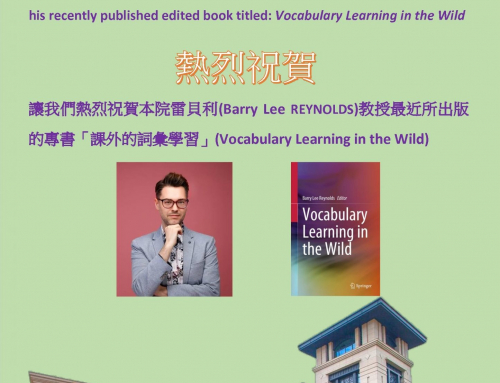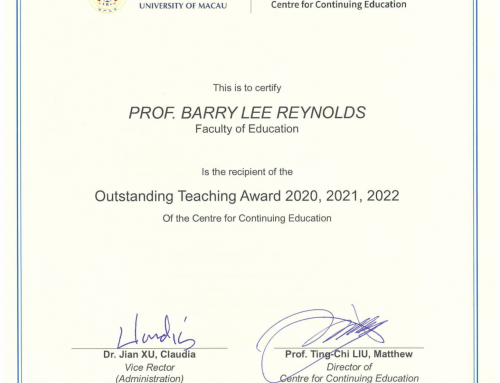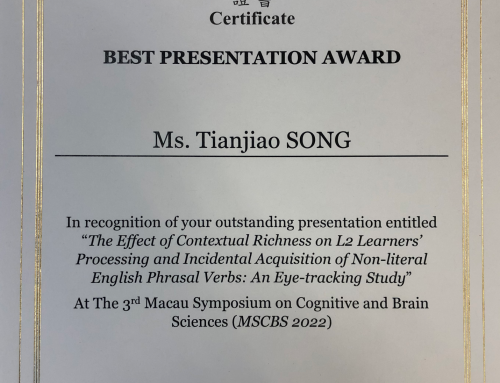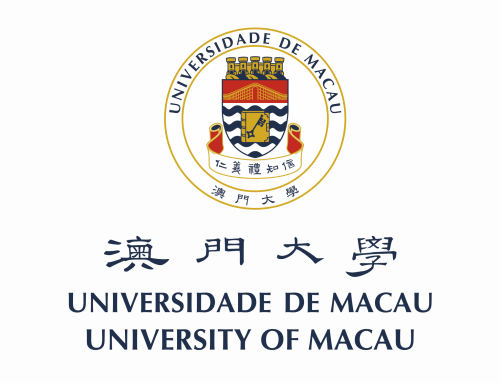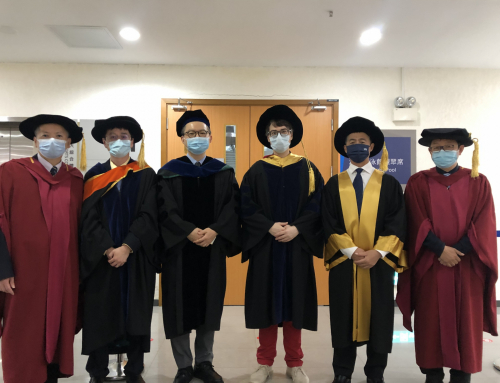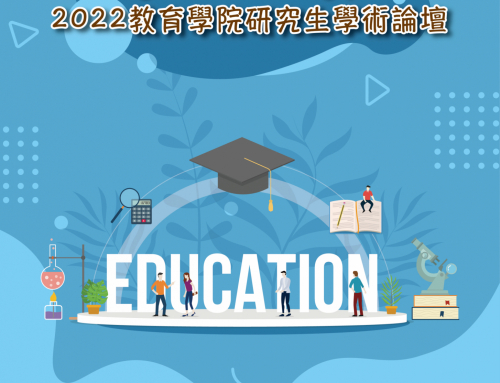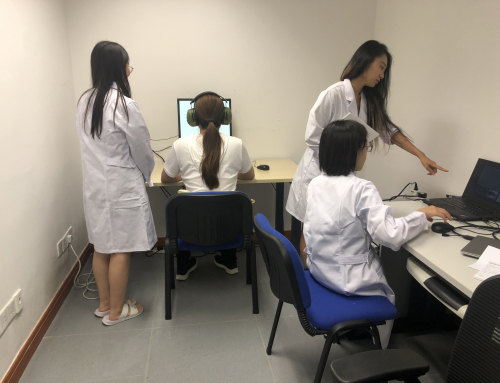Theme: Language Teaching for Young Learners
Conference Date: 20th to 22nd September
Sylvia Liu, one of the PhD students in the ALLL lab, had a proposal accepted for a presentation at the 2019 SCRELE conference held in Shanghai, China. Below Sylvia provides an overview of the conference, her participation, and what she took back with her after attending.
SCRELE Biennial Conference held from the 20th to 22nd of September in Shanghai, China at the Shanghai International Study University invited professionals (i.e., professors, middle school teachers, and PhD candidates) from institutes around the world. The majority of these attendances are experts in EFL (English as foreign language) teaching and learning; they conducted pre-conference workshops, gave plenary speeches, and organized colloquia. More than 70 concurrent sessions were conducted regarding (1) research projects on important aspects of EFL for young learners, including curricula innovation, material development, teacher training, and assessments; (2) text-book development and instructional resources for Year 1 to Year 12 in alignment with the new national curriculum standards; and (3) classroom practices. The conference provided a platform to learn from the experts in this domain. Below I provide my self-reflection of attending this international conference.
The pre-conference workshops covered children learning, second, foreign and additional languages in educational contexts between the ages of approximately 3 t0 12 years old. The two workshops (i.e., Listening to children’s voices: Can teachers hear them? and Making use of assessment to assist children’s language learning) took a global perspective and encouraged the sharing of views from audience. They provided a platform for me to seek understanding of theoretical issues and empirical evidence related to my research interests.
Workshop 1: Listening to children’s voices: Can teachers hear them? by Prof Annamaria Pinter (i.e., the author of Children Learning Second Languages and Teaching Young Language Learners).
Summary and reflection: In order to help teachers cope with daily challenges in their teaching work, Prof Pinter shared a new research trend that there is a need to listen to children’s voices and perspectives. What teachers learnt from their students can be incorporated into teachers’ daily practice. A wide range of ideas from giving children some agency to inviting them to become research partners had been shared in this workshop. To answer the question of how to focus more on children rather than teachers, Prof Pinter argued there is a perspective change from considering children as passive and vulnerable objects to active, capable subjects. This is because children are experts of their own lives. If teachers seek children’s perspectives, teachers will allow children to contribute more spontaneously to activities, will take children’s choices into account, will listen to and act on children’s views and opinions, and will allow children to make decisions about learning EFL. She gave a concrete classroom activity as an example. The craft-based tasks: a sock puppet. In this scenario, children have their own choices to make their own puppets (i.e., follow instructions regarding how to make a puppet in English). Then, children can choose their own questions to ask their teacher’s puppet which only speaks English. Children also can decide either to act out or tell a story to their peers about their puppets. The topic of their speech and drama can vary. This depends on the child’s own choice. For example, the child may talk about their puppet’s family, friends, hobbies, and recent trips in English. Furthermore, Prof Pinter described an innovative research project based on her argument in which children’s perspective are taken to explore issues of importance to EFL teaching in Indian primary classrooms. To conclude, this workshop opened my eyes through a wide range of hands-on examples and techniques. These examples and techniques illustrated the research opportunities every teacher and researcher can consider.
Workshop 2: Making use of assessment to assist children’s language learning. By Prof Yoku Goto Butler (i.e., the author of English Language Proficiency Assessments for Young Learners)
Summary and reflection: This workshop focused on classroom-based assessment. As teaching EFL is full of challenges, EFL teachers and researchers of young children are fully aware of the importance of assessment. Prof Butler answered a question regarding how best to make use of assessment to assist children’s learning. I learnt two major aspects of assessments that can be used in assessing EFL young learners. They are assessments with a summative purpose (i.e., primarily to provide a grade) and with a formative purpose (i.e., primarily to assist the learner to identify strengths and weakness). The assessments that teachers relay on most in the literature is classroom observation and standardized tests. Prof Butler also gave me some specific suggestions regarding my PhD research topic (i.e., to consider child observation as one of the assessment tool to assess very young EFL learners’ English vocabulary growth). This is because there are several issues that I need to consider when assessing very young learners. They are age (i.e., I have to consider their individual differences and whether they need more warm-up time), content of language learning (i.e., vocabulary), method of teaching (i.e., stimulation activities) and aims (i.e., language aims). When assessing very young EFL learners, Prof Butler suggested to keep in mind that children are vulnerable to adult’s attitudes towards assessment. She also shared a similar argument given by Prof Pinter that children are not merely objects being measured, but are active participants in the assessment, making inferences of their performance and taking actions accordingly with the help of teachers and other adults. Furthermore, Prof Butler described self-assessment as an assessment approach in EFL classrooms with children aged 10 and above. To conclude, this workshop shed light on my own research topic, specifically in regard to choosing the appropriate assessment for very young EFL learners.

The Conference
During the two-day conference, all scholars emphasized that English language (EL) plays an important role in contemporary young learners’ education in China. To attain linguistic proficiency in EL, EFL learners need to build up sufficient vocabulary knowledge. According to Prof Annamaria Pinter and Prof Yuku Goto Bulter, English vocabulary has been found to be the key element in young children’s English learning that constitutes the basic component of target language proficiency. This is because vocabulary (i.e., semantic knowledge) provides the basis to performance in the four skills (i.e., speaking, reading, listening and writing). Children below 12 years old have been referred to as young learners in this conference. I exchanged information and views about the teaching of English as a foreign language to very young learners (i.e., pre-primary age group) in the conference. From Prof Rod Ellis’s plenary talk, I learnt it is possible to do task-based language teaching with beginner level language learners. For example, in Shintani’s presentation, she used task-based language teaching approach with 15 students aged six who were newly enrolled in elementary school. Her findings shed light on the benefits of the implementation of this approach with young EFL learners. From Prof Chen’s presentation of her longitudinal naturalistic study, I learnt the longitudinal listening input immersion greatly facilitated very young Chinese EFL learners’ phonological awareness, English word reading and comprehension abilities. I also presented my descriptive study regarding an ECE English program for Chinese parents to use at home with their very young children and got a very good feedback from the audience.
Written by Sylvia Liu
Reviewed and Edited by Professor Reynolds



